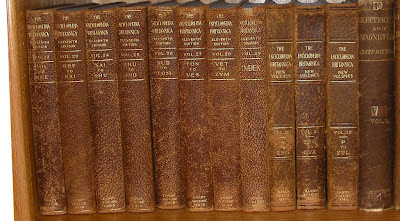PHOTO: The copy I own of a printed edition of the Encyclopaedia Britannica (Americans spell it Encyclopedia Britannica), published in 1910-1911, is shown next to the three added volumes printed in 1922. The editors apologized for having to publish an update so quickly after 1910, but say it is because of the extraordinary occurrence of the "World War" (World War II hadn't occurred yet) had compelled them to do it. In 2012 it was announced that sales for the Encyclopaedia Britannica online edition are so much more than the printed edition that they will no longer be printing it. The company insisted that Google, and I assume Wikipedia, is not the reason they are no longer printing an encyclopedia.
PHOTO: Encyclopaedia Britannica 1910-1911, Vol. 24, p. 746, "Sex" entry appears below a diagram of the Singer sewing machine shuttle mechanism. Unlike today, the idea of sex referred only to the concept that an animal was biologically male or female. No other mentions of sex were to be found in the Encyclopaedia Britannica, much to the disappointment of adolescents who were trying to learn what sex was all about. Sex education did not become widespread at public schools in America until the AIDS crisis compelled the teaching of at least safe sex to students. Prudish theocrats are still trying to ban all mentions of sex in schools, especially anything to do with being gay or homosexuality. (Note: The leather binding and high-acid paper are disintegrating and becoming discolored as the book ages.)
PHOTO: a 1997 digital edition of the Encyclopaedia Britannica on one CD ROM, produced by Netscape, the inventor of the World Wide Web standard, and sold in retail computer and book stores. It included an optional dial-up internet connection to access additional articles online. The first CD-ROM version was published in 1989 and a version went online in 1994.
Waves of nostalgia went up my spine reading the news by the Associated Press, "Encyclopaedia Britannica to stop publishing print editions, will continue digital versions," Washington Post, posted Mar. 13, 2012.
At least one newspaper columnist shares my nostalgia: Laurie Herstzel, "On Books: As Encyclopedia Britannica stops print edition, we lose a little serendipity in our lives," StarTribune, posted Mar. 15, 2012. I share her memory of how the World Book encyclopedia was simplistic compared to the more scholarly articles of Britannica. Of course, using either as a source was looked down upon by university professors grading papers, similar to today where Wikipedia is viewed with suspicion by scholars, but secretly used by all of them to quickly find the confirmed root sources of information they need for scholarly work.
Like her, I also recall browsing through the Britannica to learn random things in a similar manner to how children probably surf the internet today. I suspect children can learn even more today by browsing the internet, even though it might be hard for them to sort out the good and bad sources as an editor would do.
Yes, the transition to a computer world of paperless documents has been what I have devoted my entire life to achieving and therefore I should be happy. However, it is also sobering to see one more indication that my dream has been realized at the expense of real things becoming obsolete or lost, namely printed books and magazines, which I have also loved and cherished all my life.
The social implications of a paperless society will not be determined until long after I am dead. I speculate that digital books and media will be a two edged sword.
On the one hand, digital media will make it easier to preserve written material and make it more widely available to humans. The old librarian's concern of high-acid paper and ripped paper pages will be replaced by concerns about establishing digital standards that are required to enable the reading of older digital copies.
On the other hand, I anticipate that there will be a new problem facing historians in trying to use old documents for historical research. Many of the clues used to authenticate a paper document as being a true root source will no longer be available. It may be impossible for a historian to know if a person's blog page that is read 100 years from now is exactly what he wrote a century ago. Even for contemporaneous documents, scholars are still in disagreement about how do you cite another piece of scholarship, given that multi-media document can automatically update and change by design. Professional librarians have adopted the good, but inadequate, method of noting when a digital work was accessed. This assumes that a digital change history of a document is being kept. A change history is better than nothing, but it still seems open to problems in being to able cite and authenticate documents.
Of course, the methods used for storing information throughout human history have had their share of problems. For example, scrolls and other documents have become lost or inaccessible throughout history, which has often led to man reinventing things or making decisions that are not based on good knowledge. But as any scholar knows, digital copies may provide more information in the future, but it will not necessarily be better or useful information for mankind. I wish I could live long enough to see how this evolves.


